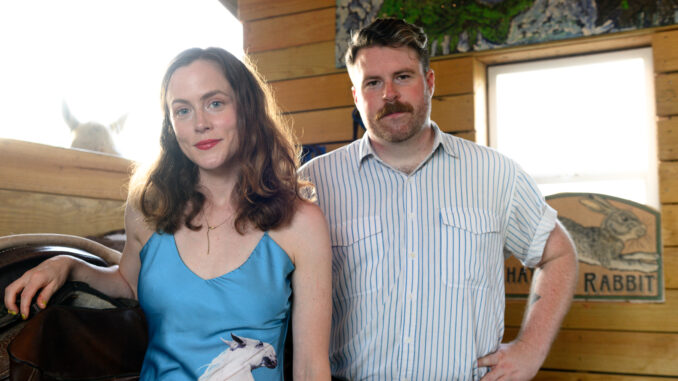
It’s hard to pin down and stamp a genre like a Notary Public would on Chatham Rabbits. The husband-and-wife duo of Austin and Sarah McCombie started out in bluegrass and old-timey music, but they have taken their guitar and banjo and stretched those roots into the garden of Americana. With their fourth album, “Be Real With Me,” they are settling into authenticity in life as in music.
There is an apparent dichotomy of personalities on stage. Sarah’s wide-eyed look darts mischievously, like she’s beholding an audience for the first time and harbouring the secrets to draw people into their beam. It’s with this combination of wonder and campy wardrobe that she approaches the audience, keeping up the in-between-song banter while Austin, unobtrusively at her side, lays down the groove for her vocals to croon over.
Sarah exudes confidence and a sense of comfort both in our conversation and on stage, which she credits to ease with crowds of people early on. Not long ago, they hosted a hundred of their fans for an overnight campout on their North Carolina farm. “It felt so good to be present with everyone. It was nothing short of amazing to sit in silence together and listen to our new album, start to finish,” she recalled in a Facebook post. “It’s pretty surreal to see people you met at the merch table wake up on your land and see them get to enjoy the views with the fog lifting as they poured a cup of coffee. Seeing Instagram fans turned real-life friends meet each other and bond over our shared passion for this music and community is incredible to me.”
The band name comes from living in Chatham County (North Carolina), where rabbits ran free for decades until hunters came and reduced the population. Its warm and fuzzy suggestion fits the duo like an old, worn pair of jeans.
The boundless exuberance and unpredictability that define Chatham Rabbits’ style is especially prominent in ‘Be Real With Me.’ Austin continues to hone in on his artistic versatility by dialling into a more earnest singer-songwriter wavelength, in contrast to their earlier albums, which are looser and scrappier in construction and concept. This album is tighter and more polished yet brims with the same nimble energy as the rest of their discography. All the pieces from the playground are still there; just a little renovation has taken place.
Chatham Rabbits have got an ace up their sleeve in their unbelievably good chemistry. They are proving, one note at a time, that they could be a headlining act of the future, but one that remains true to their roots. As Sarah sums up: “We do this stuff for y’all because we genuinely love spending time with you and getting to share the music.”
At the time of this interview, Chatham Rabbits was packing to leave on tour. While Austin put the luggage and equipment in the car, Sarah drew the assignment for this interview by Zoom call.
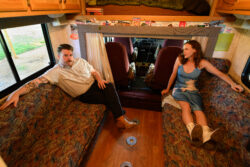
Americana UK: This is your fourth album. How would you describe the difference between this one and the previous three?
Chatham Rabbits: What we were doing before was we were playing at a lot of bluegrass festivals, and that sort of thing, but the old-time vibe is carried forward. There are pieces of that, but right now, we’re definitely Americana. Arrangement-wise, we’re moving further and further away from the old-time instrumentation and just leaning into the folk music. I mean, who knows where we’ll be in the future and how things will evolve, but this is what feels right for the moment.
AUK: The new album came out on Valentine’s Day. Was that a conscious decision?
CR: We knew we wanted to release our album in early 2025, and Valentine’s Day was falling on a Friday, so that was really great. This album is about looking in the mirror and getting very real with yourself and the people closest in your life. And for Austin and I, that’s each other. We’ve been married for almost ten years now, and we’re past the honeymoon phase, so Valentine’s Day doesn’t really appeal to us or mean that much now. Choosing Valentine’s Day as the release date is kind of a tongue-in-cheek, sarcastic nod to the commercialism and how this album is about the harder, more real aspects of being in a relationship.
AUK: You are from the Chapel Hill area near Raleigh-Durham in North Carolina. Is your town known for its rabbit population?
CR: It actually is. Siler City, which is where we lived for a couple of years, was the rabbit capital of America because people would come from all over in the early 20th century to hunt rabbits. It was the main cash crop of that area, but the rabbits were overhunted and died out. It wasn’t as popular of a sport any longer.
AUK: Makes sense. No rabbits, no sport. I saw you open for Molly Tuttle last year. People have said you are quite the storyteller, but being an opener doesn’t leave a lot of room for chat. Let’s say you’re the headliner now, could you tell our readers a story about one of your songs?
CR: Sure. One of the songs that I’m most proud of on the record is called ‘Collateral Damage.’ It’s a song that I wrote about the deep feeling that I have about wanting two things in life equally. I really hope that Austin and I can be parents one day, but I also really, really love what we do for a living. And I love the freedom and flexibility we have with our music and making art for a living, but having both of those things is difficult logistically and financially. Oftentimes, I feel like when we want opposing things, it can leave a lot of heartache and disruption in its wake. So that’s the kind of big picture for that song.
The reference I use in the song is when you’re at your beach house on summer vacation, and you’re an extrovert like me; you want to stay up and hang out, talk and have fun. But you also want to be able to take a nap and recharge. In the song, I talk about taking a beach house nap and falling asleep in the kitchen or the living room of a summer house while there’s chatter and disruption around me. Even if some people can’t relate to the bigger arc of the song and wanting to become a mother and be a touring musician, hopefully, they can relate to taking a nap.
AUK: Naps are great! Seeing you perform, you are obviously the extrovert. Is Austin more the reserved type?
CR: Austin is much less concerned about being the center of attention. I’ve always enjoyed performing, and I’ve never had any stage fright. It’s really nice that our personalities kind of balance out what Chatham Rabbits is and how we present on stage.
AUK: You can tell by the way you both dress to go on stage, too. Do you spend some time figuring out what to wear performing? You’re not a shirt-and-jeans person.
CR: We’re big music lovers and enjoy going to concerts ourselves, and we have been in different bands. I was in an old-time band; Austin was in an electronic band. As we went along, there was a lot that we didn’t know, so we just had to learn to embrace who we are naturally. Being ourselves was the best way of dressing and writing. Sometimes, it’s a more exaggerated version of who you are. I mean, I’m not on and energetic all the time, but leaning into that works really well for the stage. And the same with the wardrobe. I really love vintage clothes. I love retro silhouettes and dresses. That’s not what I wear all the time, but I do like it on stage. It’s really cool if you push it.
AUK: Do you have like a signature thing you do performing that is unique to Chatham Rabbits?
CR: Our signature thing is that we break the fourth wall, or sometimes it’s called the third wall, with the audience. We acknowledge that the audience is there; we talk to them, we point out things. We do not perform as if we’re on our own planet. We perform as if we are in someone’s living room or on their front porch. It allows for us to really make a connection with our audiences.
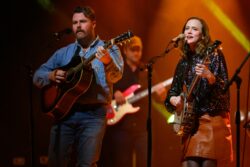
AUK: What influenced you to pursue a career in music? Austin was a financial planner, and you were a teacher.
CR: To begin with, we are both naturally entrepreneurial, always dreaming of new ideas and trying to start things. That was already a part of who we were, but we loved music as a hobby and as a pastime. Playing together was always fun for us. At that point, when we decided to start Chatham Rabbits, we were at a phase with our work where we were ships passing in the night, and we never got to see each other except for 48 hours on the weekend. Then I had a really terrible boss my last year of teaching, and so that gave me a kick in the pants to leave teaching behind and pursue music. We had no idea that it would be successful enough where we could still be doing it seven years later. We feel really fortunate for that.
AUK: The first track feels very biographical. Speaking for Austin since he wrote it, would you say that’s fair?
CR: I think ‘Facing 29’ is definitely biographical. Sometimes, when he introduces it on stage, it’s that feeling that we both had when we were leaving our twenties and realizing that, okay, stuff is getting real. We’re no longer able to lean on our parents, our youthfulness. When you hit 30, it just feels like a new chapter of life and a sort of serious adulthood. That’s definitely what he was capturing in that song.
AUK: ‘Gas Money’ sounds like a breakup song.
CR: Sort of. It’s a song that I wrote more about the sensation you have when where you just are maxed out on a friendship or relationship, what you’re able to give someone. Maybe you wish you could be a better friend, or you wish you could help them more. But life circumstances, finances or logistics, any of the big pieces in adulthood prevent you from being the type of friend that you want to be. You just kind of have to accept that and send people on their way. I’ve had that happen several times through the years. It’s really hard to stay in touch with people in this career because we are gone all the time. Life moves really fast for us, and it’s caused relationships and some of our friendships to suffer.
AUK: You have a touring band now, but during the pandemic, you were towing around a trailer, giving little performances.
CR: We pulled the trailer behind our old van, and we had solar panels that were powering our sound system. It was the way we stayed afloat. We called it the “Stay-at-Home Tour,” and we did 194 neighborhood concerts that year, which is mind-boggling to think about. We just played for tips and met so many awesome people. It was pretty amazing.
AUK: Nashville is the prime destination for Americana or country musicians. Along with a good number of other musicians, you choose to live in North Carolina. Why is that?
CR: We have a lot of great independent music venues that are not wrapped up in the politics of Live Nation and Ticketmaster. For instance, there is Cat’s Cradle near UNC, the Flat Iron in Greensboro, the Grey Eagle and the Orange Peel in Asheville, and Bourgie Nights in Wilmington. These are all venues that are run by ordinary people that understand the dynamics of the artist, the audience, and the venue. It’s a symbiotic relationship. Venues that are owned by Live Nation are just making money off the backs of artists. I think that’s part of it. There is also just the natural beauty of the state and the fact that we can get from the outer banks or the beach oceanfront all the way to the mountains in six hours or less. In a day, you can catch a saltwater fish or a brook trout in the mountains. That sort of thing really calls to artists and people with creative minds and creative passions. Historically, North Carolina has been a fairly affordable-ish place to live, but unfortunately, that is changing fast.
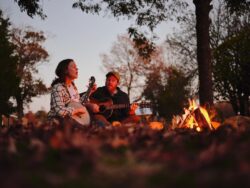
AUK: I agree with you on that. We’re moving back to East Tennessee. The one instrumental on the album is ‘Big Fish, Small Pond.’ Is that a metaphor for anything in particular?
CR: It was just a simple nod to the studio where we recorded the album. It is called Studio at Small Pond. We really liked the melody and wanted to put an instrumental track on the record. It just came together late one night. We all just sat around in a circle in the studio with mics strategically placed. It felt like a nice little breath of fresh air in the middle of the record, an intermission.
AUK: What would you say is the most vulnerable song you’ve written?
CR: Austin wrote ‘Did I Really Know Him’ about being a person who knows a lot of facts about themselves or their spouse, their parent or their best friend, but they don’t really take the time or get vulnerable and real enough to really know themselves.
AUK: Are their songs from past records that are still favourites to play?
CR: I really love the song Austin wrote called ‘Mike and David’ on the second record. Another favorite song is called ‘This Year.’ And I really love a song from our first record called ‘Bugle Boy,’ which I wrote when I was in college. I’m still surprised at how good it is.
AUK: What’s that one about?
CR: I wrote it after I read the book, “The Oldest Living Confederate Widow Tells All” by a North Carolina author named Alan Gurganus. It’s a story of a woman that married a man who had been a bugle boy in the Confederate army. She was really young when she married him, and he was really old. His childhood trauma and PTSD from the Civil War ended up ruling her life, and she became his caretaker. The story was fascinating, and I wanted to write a song about it.
AUK: Could you tell us about ‘This Year?’
CR: This is a song about when you try to make positive changes in your life, but only people don’t notice that you’re making those changes because these are small steps and small revelations. Sometimes, it takes a long time for other people to notice how far you’ve come.
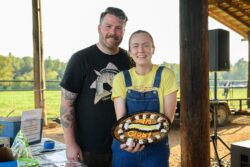
AUK: You must get a lot of compliments on your music. Has anyone offered a compliment that really touched you?
CR: People that work at a venue where we play – maybe they’re the door person or security or a bartender – and they have to be there because they’re getting paid to work at the venue, but they come up to us afterwards and say how much they enjoyed it, or they buy merch from us. That is such a compliment because those people have no choice but to be there, and they don’t know us from Adam.
AUK: When you decided to become professional musicians, did you worry what that would be like also being married? I mean, your personal life is entangled with the same person. I would be a little bit sceptical about how it would work out, I guess, as to what would happen if the music wasn’t going as well as we thought and one person had a difference of opinion.
CR: I think we were a little concerned about that, but we were more excited about the prospects. There are definitely challenges, but we are so lucky to be doing this together. I can’t imagine what it would be like to be a tour musician and have your spouse in a different line of work. It would be really hard to not be with him. Touring is really hard on relationships. We thought about it a little bit, but it definitely didn’t stop us.



great article and great music. Love their songs and attitude. Went onto Bandcamp and bought the album